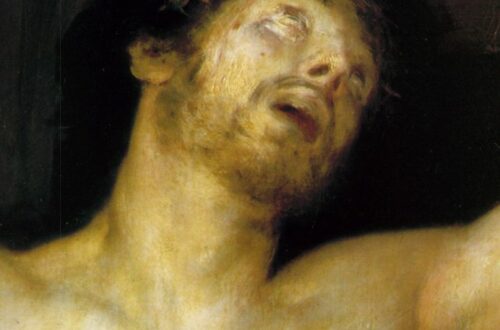Bob Seidensticker argues that Psalm 22 is not a prophetic psalm depicting the suffering of the Messiah.
First, Seidensticker argues that the opening phrase, “My God, why have you forsaken me?” could not be the words of the Messiah. Instead, those words are a gnostic application of the psalmist:
Does forsaking Jesus sound like part of God’s plan? This doesn’t sound like the cool-headed, in-control Jesus written about in Luke and John… What it sounds like is Gnosticism (not in the Psalm, but when transplanted into the gospels). The Gnostic Gospel of Philip (third century) explains it this way, “‘My God, My God, why, lord, have you forsaken me?’ [Jesus] spoke these words on the cross, for he had left that place.” That is, Christ the god entered Jesus the man at baptism (remember the dove?) but then abandoned Jesus at the crucifixion.
Seidensticker seems to assume that if Jesus said these words, they could not mean anything apart from what a gnostic would mean by them. But this is simply to ignore other options (of course, Sidensticker also has to deny the veracity of the gospel reports). Admittedly, exactly what the Messiah means is not given to us by either the psalmist or Matthew and Mark. But that is not to say that we have to accept a gnostic view either. Some commentators think that there is a real rupture within the Trinity. Others think the cry is the cry only of the Messiah’s human nature. Still others consider the Messiah’s cry to be emotional and does not reflect any real abandonment of the Son by the Father. All these discussions have implications for one’s view of the Trinity and the incarnation, both of which are difficult doctrines. Nevertheless, it is entirely false that only a gnostic reading makes sense of the text.
Second, Seidensticker argues that verse 16 should be translated, “wild dogs surround me—a gang of evil men crowd around me; like a lion they pin my hands and feet.” not as, “For dogs have surrounded me; A band of evildoers has encompassed me; They pierced my hands and my feet.” The difference lies in how one treats a Hebrew word. Is the word ka-aru, meaning ‘they pierced’? Or is it ka-ariy, meaning ‘like a lion’?
Seidensticker rightly notes that there are arguments for both sides, but opts for the latter reading. He provides two arguments for his view. First, the NET agrees with Seidensticker’s reading. And second, his reading fits better with the context (since we already have wild dogs and other zoomorphisms in the psalm).
So, what about arguments for the other side? Here are four arguments from Micheal Wechsler’s commentary: First, the LXX, Peshitta, and the Vulgate all support the traditional reading. It should be noted that the NET is unusual for contemporary English translations with the NASB, ESV, and HCSB all supporting the traditional view. Second, the NET has to supply the verb, to pin. Without it, the phrase is very obscure and awkward. Third, if the lion is supposed to be a symbol for the ‘evil men’ why is it in the singular and not the matching plural. A far more natural thing to say is that the evildoers are like lions. Finally, the oldest extant manuscript of this psalm attests to the traditional reading.
Seidensticker lists three verses that he thinks discount a prophetic reading of the psalm:
Verse 9: “Yet you brought me out of the womb; you made me trust in you”—again, this sounds like an ordinary man. The first person of the Trinity wouldn’t need to make the second person of the Trinity trust him… Verse 12: “Many bulls surround me; strong bulls of Bashan [a place known for its cattle] encircle me. Roaring lions tearing their prey open their mouths wide against me.” Bulls and lions? That sounds like martyrdom in an arena, not crucifixion… Verse 17: “I can count all my bones.” This unfortunate guy is clearly mistreated, but (again) this isn’t the gospel story.
Each of Seidensticker’s comments is worth a response. In regards to verse 9, Sidensticker equivocates between a non-divine human being’s trust in God and a divine human being’s trust in God. There is no reason to suggest that the Messiah would not trust in the Father in the latter sense. Indeed, Christ’s life is one that displays meticulous trust in the will of the Father (Luke 22:42). Nor is there any reason to suggest that in order to be ‘made to trust’, Jesus would have to begin to trust having not trusted him before. After all, the kind of trust being displayed–that between the divine, incarnate Son and the Father–has a beginning (at the point of being brought from the womb or thereabouts). But this does not entail that the divine Son had no trust in the Father prior to the incarnation.
In regards to verse 12, as Seidensticker has just suggested with his interpretation of verse 16, the use of animals is not to be taken literally. Indeed, the psalmist is using standard zoomorohism, the ascription of animal properties to persons. As far as bone counting, I have (in a v. brief glance of a couple of commentaries) found no precise meaning to this phase apart from the obvious imagery of being stretched to breaking point. But this does sound like the gospel!
Finally, Seidensticker argues that the psalm could not be about the Messiah since it contains no reference to the resurrection. It might behoove Seidensticker to complete his reading of the psalm focusing on the latter half (verse 22-31). The Messiah leads the people of Israel to praise and glorify the Lord. But he does so after his suffering. Though not explicit, the resurrection is quite compatible. Indeed, the Messiah promises a similar deliverance to those who trust in the Lord (25-26). How else might the sufferer “eat and be satisfied” after his suffering unless he has been delivered from that suffering. And if that suffering is death (v. 15), then deliverance is resurrection.




